40+ Amazing Fictional ISTP Characters
Want to discover some of the most iconic and memorable ISTP characters in TV, books, or movies? Today we’re going to explore forty-three of the most powerful ISTPs in fiction. Let’s get started!
Not sure what your personality type is? Take our new personality questionnaire here. Or you can take the official MBTI® here.

43 Fictional ISTP Characters

#1 – Ilya Kuryakin from “The Man from U.N.C.L.E.”
Napoleon Solo: “Ilya, are you free?”
Ilya Kuryakin: “No man is free who works for a living. But I’m available.”
Practical and intense, Ilya Kuryakin is the perfect counterpart to his more extroverted, womanizing partner, Napoleon Solo. Kuryakin thinks quickly, analyzes complex situations deeply, and keeps himself emotionally detached during intense situations – avoiding many of the romantic disputes that his partner gets himself into. As a PhD-holding secret agent, he uses his skills in analysis and combat to work with a wide range of weapons and explosives.
#2 – Natasha Romanov (Black Widow)
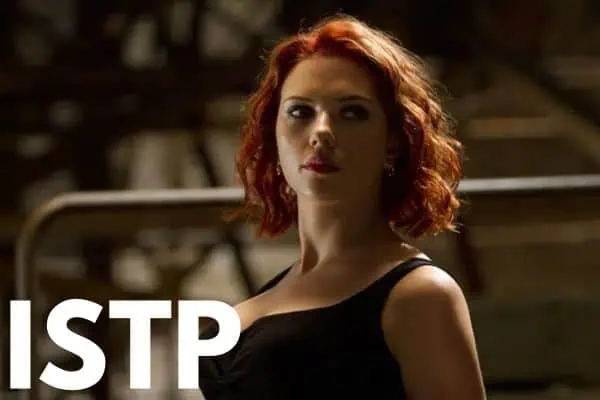
“I get emails from a raccoon. Nothing sounds crazy anymore.” – Natasha Romanov
Reserved, detached, and quick on her feet, Black Widow is something of a stereotypical ISTP. She makes decisions based on what’s logical rather than following her feelings (except in cases of life or death for the people she loves). As an ex Russian spy and current member of the Avengers, Romanov uses her tactical abilities to defeat some of the most daunting opponents. In typical ISTP fashion, Romanov stays focused on the task at hand and knows how to detach herself from chaos in order to think clearly.
#3 – Dr. Alan Grant from “Jurassic Park”

“Reverse Darwinism: Survival of the most idiotic.” – Dr. Alan Grant
Dr. Alan Grant is a paleontologist who was one of the first people invited to tour Jurassic Park. His cool, analytical demeanor and sly, sarcastic sense of humor will be relatable to any ISTP. Like all ISTPs, Grant wants to understand how things work by taking them apart and observing them closely. The chance to see dinosaurs in real life is both exhilarating and terrifying for him because unlike many of his counterparts, he can guess how dangerous this experiment is.
#4 – Django Freeman from “Django Unchained”
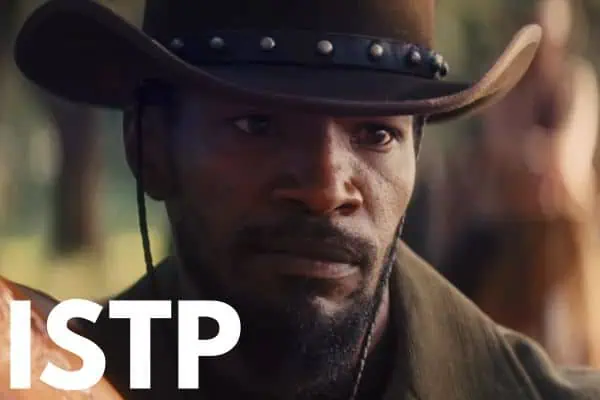
Dr. King Schultz: “How do you like the bounty hunting business?”
Django: “Kill white people and get paid for it? What’s not to like?”
Cool, quiet, and tactically efficient, Django Freeman doesn’t care about being well-liked as much as he cares about achieving his goal: freeing his wife Broomhilda. Thanks to his auxiliary Extraverted Sensing side, Django can understand how to use weaponry quickly and respond rapidly without getting panicky or nervous. Because of his introverted thinking side, he’s able to analyze and troubleshoot crisis situations from many different leverage points.
#5 – Patrick Verona in “10 Things I Hate About You”

Cool-headed and practical, Patrick Verona uses his charm and sense of adventure to woo Kat Stratford. Situations that might bother other types seem like no big deal to Patrick. For example, when Kat gets drunk and vomits everywhere, he doesn’t run away or act startled. He simply takes care of the problem and gets her home. When people are spreading rumors about him at school, he doesn’t even bother trying to refute them because he knows they’re not true. He follows his own sense of logic and enjoys the freedom that comes with being a loner.
#6 – Harry Callahan, i.e. “Dirty Harry”

“You’ve go to ask yourself a question: ‘do I feel lucky?’ Well, do ya, punk?” – Harry Callahan
Harry Callahan, nicknamed “Dirty Harry,” is an inspector who doesn’t like playing by the rules. In typical ISTP fashion, Callahan cuts past bureaucracy and professional boundaries to do what needs to be done in violent situations. His unconventional methods are frowned upon by superiors, but he doesn’t care. He follows his own code and within that code people guilty of violent crimes deserve to be violently obliterated. Callahan’s marksmanship abilities and combat skills make use of his Extraverted Sensing side, and we continually see his use of Thinking over Feeling when it comes to troubleshooting crisis situations.
#7 – Ennis Del Mar in “Brokeback Mountain”

Alma Jr.: “Daddy, you need more furniture.”
Ennis Del Mar: “Yeah, well…if you got nothing, you don’t need nothing.”
Reserved, mysterious, and complicated, Ennis Del Mar is a good example of an ISTP who is struggling to understand his own values and romantic needs. Rough-mannered and quiet on the outside, Ennis consistently chooses what he feels is the most practical and logical path for his life instead of following his heart. Underneath his tough shell, Ennis does have a vulnerable, emotional side – but he’s unwilling to let anyone see that except in his most trying moments.
#8 – John Wick

“When Helen died, I lost everything. Until that dog arrived on my doorstep…A final gift from my wife…In that moment, I received some semblance of hope..an opportunity to grieve unalone…And your son…took that from me. Stole that from me. Killed that from me! People keep asking if I’m back and I haven’t really had an answer. But now, yeah, I’m thinkin’ I’m back.” – John Wick
Stoic, mysterious, and tactically ingenious, John Wick captures many of the most notable ISTP qualities. He’s deeply private, not letting anyone in on the thoughts and strategies running through his mind until the peak of the film. Rather than complaining or looking for outward support, Wick has one goal: destroy the people who killed the dog his late wife left him. Wick is unstoppable in combat and quietly sneaks up on even the most well-trained assassins and bodyguards. As Zombies Ruins Everything states, “The Se of Wick is clear as it takes up most of the movie. No, really, this doesn’t need explaining. The total kill count by Wick in the movie is an estimated 80, give or take of course. Efficiently, Wick dispatches most of them with bullets to the chest and head.”
#9 – Mrs. Jane Smith from “Mr. and Mrs. Smith”

“Happy endings are just stories that haven’t finished yet.” – Jane Smith
Jane Smith is rational, observant, and practical. She keeps her feelings close to the chest and often disregards them completely as she focuses on structuring the world around her to stay on task. Like most ISTPs, she handles chaos adeptly, focusing on her task instead of getting sidetracked by details or feelings that might get in her way. She showcases the ISTP’s unique ability to adapt to sudden changes and improvise on the fly.
#10 – The Driver in “Drive”

“How about this: You shut your mouth or I’ll kick your teeth down your throat and shut it for you.” – The Driver
Quiet, mysterious, and action-driven, The Driver is one of those stereotypical strong, silent ISTPs. He loves an adrenaline rush and enjoys tinkering with vehicles and improving his abilities as a stunt driver. When danger threatens, The Driver keeps a straight face and logically analyzes the leverage points of any side he chooses to take. He studies his environment carefully, predicts his enemies’ moves, and calculates his drives with the kind of precision that ISTPs are famous for. While he may seem mysterious and unreadable, he maintains total control of the situations he encounters.
#11 – Saitama from “One Punch Man”

“If you really want to become strong, stop caring about what others think about you. Living your life has nothing to do with what others think.” – Saitama
Saitama hungers for a challenge and grows frustrated with a life that seems bereft of action and intimidation. While his opponents rant and rave about their power and skill, he anticlimactically punches them one time, thereby sending them to their doom. In typical ISTP style, Saitama hates long-winded, rambly types. He likes people who keep their words limited to 20 or less (maybe he would have liked Twitter?). His reasonable, tactically proficient, independent nature will be relatable to any ISTP.
Read This Next: Here’s the Anime Character You’d Be, Based On Your Myers-Briggs® Personality Type
#12 – Jason Bourne from “The Bourne Identity”

“I can tell you the license plate numbers of all six cars outside. I can tell you that our waitress is left-handed and the guy sitting up at the counter weighs two hundred fifteen pounds and knows how to handle himself. I know the best place to look for a gun is the cab or the gray truck outside, and at this altitude, I can run flat out for a half mile before my hands start shaking. Now why would I know that? How can I know that and not know who I am?” – Jason Bourne
ISTPs have a unique ability to capture the world around them exactly as it is and remember things exactly as they are in very specific detail. This ability is emulated perfectly in Jason Bourne, who also has the ISTP’s ability to adapt to sudden changes, respond quickly to sudden crises’, and stay cool and level-headed when things are chaotic and dangerous. Bourne’s innate ability to stay focused on the present, be tactically proficient, and immediately notice threats in his surroundings are signs of his advanced use of Introverted Thinking and Extraverted Sensation. ISTPs will relate to his hunger for truth, his boldness in action, and his calm, cool demeanor.
#13 – Will Hunting (Good Will Hunting)
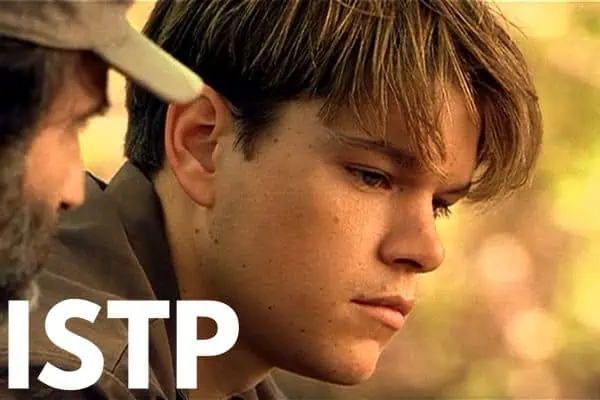
Sean Maguire: “You’re just a kid. You don’t have the faintest idea what you’re talking about.”
Will Hunting: “Why, thank you.”
Will Hunting is an independent thinker who sees the world through a sharp, analytical lens. As an ISTP, he’s practical, skeptical of authority, and prefers action over words. He doesn’t need validation from others—he trusts his own logic, instincts, and abilities to navigate life. While others might feel trapped by circumstances, Will knows he can outthink, outmaneuver, or fight his way through any situation. His wit is razor-sharp, his problem-solving skills are nearly unmatched, and his ability to stay emotionally detached (sometimes to a fault) is classic ISTP.
#14 – Ben Shakir (Evil)

“Why does psychology always sound like a con to me? It does. It’s like religion for grad students.”
Ben Shakir is the ultimate skeptic, always looking for the most logical, scientific explanation behind the supernatural chaos surrounding him. He’s cool-headed, observant, and quick to act in a crisis. While his job as a technical expert means he’s constantly analyzing problems, he’s also got a dry, sarcastic sense of humor that keeps things from getting too heavy. Like a true ISTP, Ben doesn’t waste words—he focuses on facts, action, and getting things done. His ability to think on his feet and improvise solutions makes him an invaluable member of the team.
#15 – Toji Fushiguro (Jujutsu Kaisen)

“But you guys, with all your blessings, lost to a monkey like me who can’t even use jujutsu.”
Toji Fushiguro is the definition of an ISTP powerhouse—cunning, skilled, and brutally efficient. He doesn’t overcomplicate things with unnecessary emotions or introspection; instead, he focuses on results. With his sharp reflexes and instinctive combat skills, he takes on opponents far beyond his weight class, relying on raw skill and tactics rather than supernatural advantages. Like most ISTPs, he’s at his best in high-stakes situations, adapting quickly and using his surroundings to his advantage. His calm demeanor and ability to detach from emotions make him a formidable force in any fight.
#16 – Rosa Diaz (Brooklyn Nine-Nine)

“I have seven knives on me. Maybe eight. I lost count.”
If you looked up ISTP in the dictionary, you’d probably see a picture of Rosa Diaz scowling back at you. Stoic, independent, and fiercely competent, Rosa is a woman of action who doesn’t waste time on unnecessary chatter. She’s a skilled detective, an expert fighter, and a problem-solver who faces chaotic situations with cool determination. Like many ISTPs, she doesn’t wear her emotions on her sleeve, preferring to keep her personal life private. But when it comes to getting the job done? No one is more reliable—or more intimidating.
#17 – Charlie Strong (Peaky Blinders)

Thomas Shelby: “They want to know if I’m scared.”
Charlie Strong: “Make them wonder.”
Charlie Strong is the quiet, no-nonsense fixer of the Peaky Blinders. Unlike the more ambitious, power-hungry members of the Shelby family, Charlie stays grounded, focusing on survival and practicality over grand visions of power. His ISTP nature shines through in his resourcefulness, ability to handle high-pressure situations, and his preference for action over words. He doesn’t make emotional decisions, nor does he let sentimentality cloud his judgment—he simply does what needs to be done with minimal fuss. Whether it’s smuggling weapons, fixing up a stolen car, or handling a corpse, Charlie gets the job done with the calm precision of a true ISTP.
#18 – Sherlock Holmes (Sherlock)

“I’m not a psychopath, Anderson. I’m a high-functioning sociopath. Do your research.”
Sherlock Holmes embodies the ISTP’s love for problem-solving, logic, and detached observation. He doesn’t care about social conventions, emotional pleasantries, or fitting in—he cares about figuring things out. His Introverted Thinking (Ti) makes him hyper-analytical, tearing apart mysteries piece by piece, while his Extraverted Sensing (Se) gives him an uncanny awareness of his environment. He notices details others miss, adapts quickly to new information, and remains cool under pressure. While he can be cold and socially unaware, Sherlock is a master of troubleshooting complex problems with the sharp precision of an ISTP mind.
#19 – Levi Ackerman (Attack on Titan)

“The only thing we’re allowed to do is believe that we won’t regret the choice we made.”
Levi Ackerman is the ultimate ISTP soldier—pragmatic, adaptable, and ruthlessly efficient. He doesn’t let emotions cloud his judgment, instead focusing on what needs to be done to survive. His combat skills are a testament to his ability to think and react in real time, using his surroundings to his advantage and executing plans with surgical precision. Like many ISTPs, Levi keeps his emotions tightly guarded, only revealing glimpses of his deeper thoughts in rare moments. He doesn’t follow rules blindly—he makes his own calculations and does what he believes is right, regardless of authority.
#20 – Colt Seavers (The Fall Guy)

“Well, it all hurts. It always hurts. Getting hit by a car hurts. Getting set on fire hurts.“
Colt Seavers is the perfect embodiment of an ISTP daredevil. Fearless, adaptable, and always up for a challenge, he thrives in high-intensity situations that require quick reflexes and hands-on problem-solving. He doesn’t waste time overanalyzing—he trusts his instincts and reacts in the moment. Whether he’s jumping off buildings, crashing through explosions, or making split-second decisions in the heat of action, Colt moves with the confidence and cool-headedness that define an ISTP. He’s not one for unnecessary small talk, but his dry humor and wry sense of humor make him effortlessly charismatic.
#21 – Bill (The Last of Us)
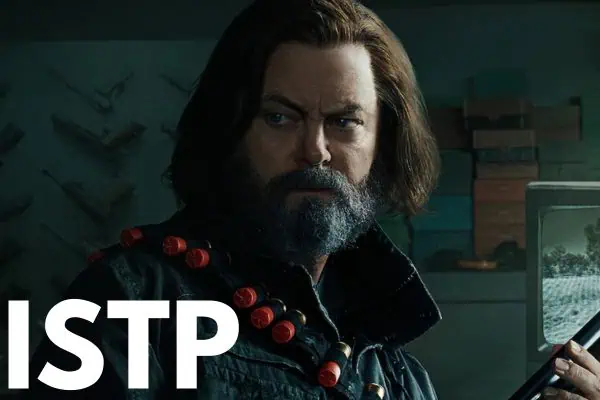
“The infected are bad, but at least they’re predictable. It’s the normal people that scare me.”
Practical, self-sufficient, and fiercely independent, Bill is an ISTP survivor through and through. While others panic in the face of societal collapse, Bill gets to work, building an elaborate security system and adapting his environment to his needs. He doesn’t rely on anyone but himself, creating a life of solitude where he can tinker, build, and live on his own terms. His Extraverted Sensing (Se) shows in his quick reactions and sharp tactical awareness, while his Introverted Thinking (Ti) allows him to analyze threats and troubleshoot problems efficiently. Though gruff and emotionally guarded, Bill’s actions ultimately speak louder than words.
#22 – Guts (Berserk)

“I’d rather fight for my life than live it.”
Guts is an ISTP at his most intense—fierce, relentless, and deeply independent. He doesn’t trust easily and prefers to rely on his own strength, both mentally and physically. A skilled warrior, he reads the battlefield with sharp precision, adapting his tactics on the fly and using his surroundings to his advantage. His detached, no-nonsense demeanor hides a deeply analytical mind, constantly assessing threats and determining the best course of action. Like many ISTPs, Guts isn’t one for unnecessary emotional displays, but his loyalty runs deep, and when he does care, it’s with an intensity that matches his fighting style.
#23 – Hwang Jun-Ho (Squid Game)

“The real game begins when people stop playing fair.”
Detective Hwang Jun-Ho is a textbook ISTP investigator—sharp, independent, and methodical. When he infiltrates the deadly Squid Game operation, he remains calm and observant, gathering information while staying completely under the radar. He doesn’t act impulsively; instead, he waits for the right moment, analyzing every detail before making his move. His ability to think quickly under pressure, adapt to unpredictable situations, and troubleshoot problems on the fly are all hallmarks of the ISTP mindset.
#24 – Daryl Dixon (The Walking Dead)

“I ain’t afraid of nothin’.”
Daryl Dixon is the ultimate survivalist ISTP. He’s tough, resourceful, and somehow manages to thrive in a world where quick thinking and adaptability mean the difference between life and death. While others rely on groups for emotional support, Daryl is self-sufficient, preferring to handle problems on his own. His sharp instincts and ability to react in real-time make him one of the most effective fighters and hunters in the group. Like a true ISTP, Daryl doesn’t waste words—he expresses himself through action. His rugged, no-nonsense approach to life may make him seem emotionally detached, but beneath the surface, he deeply cares about his fellow survivors, to the point of risking his life for them.
#25 – Virgil Hilts “The Cooler King” (The Great Escape)

Von Luger : “Are all American officers so ill-mannered?”
Hilts : “Yeah, about 99 percent.”
Captain Virgil Hilts, known as “The Cooler King,” is the embodiment of an ISTP rebel. Independent and daring, he refuses to conform, even in the most restrictive circumstances. His ability to analyze situations quickly and make split-second decisions makes him a master escape artist, constantly outwitting his captors. Whether he’s sneaking around a prison camp or making a high-speed motorcycle escape, Hilts relies on his sharp instincts and logic to stay one step ahead. He may not be the most talkative, but his confidence and cool demeanor make him a natural leader among those looking for a way out.
#26 – Maeve Wiley (Sex Education)

“No feelings. Sounds cool.”
Maeve Wiley is an ISTP with an edge—intelligent, independent, and fiercely capable. She doesn’t sugarcoat things, and she definitely doesn’t follow the crowd. She’s practical, logical, and skeptical of authority, choosing to figure things out on her own terms. While she has a deeply analytical mind and a talent for problem-solving, she also has a sharp, sarcastic wit that keeps people at arm’s length. Like many ISTPs, Maeve is emotionally guarded, preferring action over vulnerability. But beneath her tough exterior, she’s deeply loyal to the people she chooses to let in.
#27 – Roronoa Zoro (One Piece)

“You Do What You Can, The Best That You Can And Then You Turn To The Others And Expect The Same From Them.”
Roronoa Zoro is a quintessential ISTP warrior—cool, confident, and action-oriented. He doesn’t talk much unless he has something important to say, and he lets his skills do the talking instead. His mastery of the sword is a direct reflection of his ability to adapt and refine his techniques through trial and error. Zoro thrives in high-stakes combat, keeping a level head while analyzing his opponents’ weaknesses and responding with precision. He values independence and doesn’t waste time on unnecessary drama, preferring a simple, straightforward approach to life: train hard, fight well, and stay loyal to those who’ve earned it.
#28 – Ferb Fletcher (Phineas and Ferb)

Phineas: Hmmm. It just occurred to me I may have misspelled ‘time machine’ on the plans.
Ferb: Well, I hope that’s not going to be an issue.
Ferb Fletcher is the ultimate quiet genius. While his brother Phineas (ENTP) does most of the talking, Ferb is the one who gets things done. His ISTP nature is evident in his hands-on, action-first approach—he builds, engineers, and executes elaborate inventions without breaking a sweat. He may not say much, but his ability to stay calm under pressure and bring ingenious ideas to life is second to none. Like many ISTPs, Ferb doesn’t feel the need to explain himself—his actions speak louder than words, and when he does have something to say, it’s short, to the point, and often brilliantly dry.
#29 – Kristoff (Frozen)

“Reindeer are better than people.”
Kristoff is practical, self-sufficient, and not one for dramatic displays of emotion. He prefers the company of his reindeer, Sven, to most people and doesn’t waste time on unnecessary conversation. His hands-on skills as an ice harvester, his adaptability in dangerous situations, and his straightforward, sometimes clueless approach to emotions are all quintessentially ISTP. While he may not always say the right thing, his actions prove his goodness and competence. He doesn’t follow traditional romantic scripts—he shows up, supports Anna when she needs him, and isn’t afraid to call out nonsense when he sees it.
#30 – Lee (Civil War)

“Every time I survived a war zone, I thought I was sending a warning home – “Don’t do this”. But here we are.“
Lee isn’t a thrill-seeker. She’s not someone who gets off on war zones the way Joel does, nor does she have Jessie’s reckless ambition. She’s an observer, a documenter, someone who once believed in the power of her work but now—she’s not so sure. Her ISTP nature shows up in her pragmatic, detached approach to survival, her ability to get through chaos with sharp instincts and tactical precision. But beneath that hardened exterior, there’s a slow unraveling. The cumulative weight of her experiences wears her down, and as the film progresses, we see her existential crisis deepen.
She doesn’t react the way others do—when Sammy is killed, she doesn’t lash out or break down. Instead, she methodically cleans his blood, checks in on her team, and moves forward with a resigned inevitability. She’s not callous—she’s just seen enough to know that this is how it goes. Her moral journey is one of disillusionment; she starts with a sense of duty, but by the end, she’s questioning if there was ever a point to it at all.
#31 – Shouta Aizawa “Eraser Head” (My Hero Academia)

“Okay. It took eight seconds before you were quiet. Time is limited. You kids are not rational enough.”
Aizawa is the ISTP mentor you don’t want to mess with—sharp, pragmatic, and brutally efficient. As Eraser Head, he cuts through nonsense with an unimpressed gaze, focusing only on what matters. He isn’t interested in flashy heroics or inspirational speeches; he teaches by example, pushing his students to think and react in real-time. His Extraverted Sensing (Se) allows him to assess situations quickly, while his Introverted Thinking (Ti) makes him unscrupulously rational. He’s not one for emotional pep talks, but his quiet, calm presence proves his deep commitment to those he cares about.
#32 – Astrid (Beetlejuice Beetlejuice)

“I swear, the afterlife is so random.”
Astrid is sharp, skeptical, and fiercely independent. Unlike her mother, Lydia, she doesn’t believe in ghosts, refusing to entertain anything she can’t see or prove herself. Her pragmatic, no-nonsense approach to life makes her feel worlds apart from her mother, especially after her father’s death—a loss she blames Lydia for, deepening their rift. Rebellious and detached, Astrid keeps people at arm’s length, avoiding emotional entanglements and focusing on what she can control. Like most ISTPs, she doesn’t waste words or entertain nonsense, but beneath her cool exterior, there’s an underlying grief she hasn’t fully processed. She moves through life with an air of quiet defiance, unwilling to be defined by the past—but not entirely sure what her future holds, either.
#33 – Sevika (Arcane)

“If you have to say you’re in charge… you’re not.”
Sevika is an ISTP powerhouse—tactically sharp, ruthlessly efficient, and dauntless in her pragmatism. She doesn’t care for sentimentality or empty words; she believes in action. When Vander refuses to retaliate against Piltover, she sees weakness, not wisdom, and makes her own choices accordingly. A survivor through and through, she adapts to every setback, from losing her arm in an explosion to navigating the shifting power struggles of Zaun. She’s not just a brutal enforcer—she’s a strategist, someone who knows when to fight, when to cut losses, and when to challenge authority. Her loyalty isn’t blind, and she’s not afraid to question Silco’s leadership when she sees a threat to their cause. Cold, calculating, and utterly relentless, Sevika moves through Zaun’s underworld with the quiet confidence of someone who knows she can take on anyone—and win.
#34 – Arya Stark (Game of Thrones)

“The world doesn’t just let girls decide what they’re going to be.”
Arya Stark is practical, independent, and always focused on survival. She doesn’t waste time on unnecessary emotions or conventions; she learns by doing, hones her skills through trial and error, and adapts to whatever situation she’s thrown into. Her ability to assess threats, move with precision, and stay level-headed under pressure makes her a natural warrior. She’s not one for grand speeches or displays of affection, but her quiet determination and sharp instincts make her one of the most formidable characters in Westeros.
#35 – Hotaru Haganezuka (Demon Slayer)

“If you break another sword, I’ll kill you!”
Hotaru Haganezuka, the bad-tempered swordmaker in Demon Slayer, is so dedicated to his work he can ignore rampant demon attacks while perfecting his work. He loves to learn all he can about swordmaking, and refines his work to make it as perfect as possible. He’s a little intense, but his intensity is matched only by his excellence. He doesn’t care about small talk or making friends; he cares about results. And if anyone messes with his swords, they better watch out!
#36 – Benny (The Bikeriders)

“You’re a grown-up, man. You got a house. You got a job. I don’t want that. I don’t care about none of that.“
Benny is a ghost in his own story—silent, enigmatic, and more action than talk. As an Outlaw biker, he operates by instinct, guided by a restless energy that fuels his reckless decisions. He’s not interested in explaining himself; he lives by his own rules, fully committed to the club, no matter the cost. Like many ISTPs, Benny is comfortable with risk, using his quick reflexes and sharp awareness to explore the world on his own terms. The Benny that exists onscreen is more of an idea than a person, a man whose identity is shaped as much by legend as by reality—something he would probably find amusing, if he cared enough to comment on it.
#37 – Michonne (The Walking Dead)

“Anger makes you stupid. Stupid gets you killed.”
Michonne is the definition of an ISTP survivor—pragmatic, detached, and utterly capable. After losing her family, she retreats into isolation, perfecting her swordsmanship and developing a hyper-awareness of her surroundings. She trusts her instincts above all else, reading people and situations with a sharp eye. Like many ISTPs, she prefers action over words; she doesn’t waste time explaining herself or making emotional appeals—she simply does what needs to be done. Her relationship with Rick and his children slowly chips away at her hardened exterior, revealing the loyalty and protectiveness that lie beneath. But at her core, Michonne remains fiercely independent, always prepared for the worst and ready to act without hesitation.
#38 – Spike Spiegel (Cowboy Bebop)

“Whatever happens, happens.”
Spike Spiegel moves through life with the detached cool of a man who’s seen it all and expects nothing. A classic ISTP, he moves on instinct, handling every fight, chase, and bounty with a mix of skill and improvisation. He doesn’t plan ahead—he reacts, relying on his sharp reflexes and ability to read a situation in real time. Beneath the nonchalant attitude and lazy smirk, there’s an undercurrent of sadness, a man running from a past he doesn’t talk about. He plays everything off like he doesn’t care, but when push comes to shove, his actions reveal a deeper sense of honor and a quiet, unshakable resolve.
#39 – William “Will” Munny (Unforgiven)

“We all got it coming, kid.”
Will Munny is an ISTP at the end of his road—a man who’s spent his life surviving by the gun, now trying to leave it all behind. But survival is what he knows best, and when he’s pushed, that old instinct kicks in. Unlike his younger, reckless self, this Will is weathered, tired, and more focused on his relationships than power. He doesn’t fight out of anger—he fights because he has to. His past has made him a realist, someone who doesn’t believe in justice, just cause and effect. Like many ISTPs, he’s emotionally reserved, expressing himself through action rather than words. And when the time comes, he doesn’t hesitate—he does what needs to be done, without regret or apology.
#40 – Indiana Jones

“I don’t know, I’m making this up as I go.”
Indiana Jones is the quintessential ISTP adventurer—brilliant, resourceful, and always one step ahead of danger. He doesn’t overthink things; he dives in, relying on quick reflexes, sharp instincts, and an impressive ability to adapt to any situation. Whether he’s dodging booby traps, brawling with Nazis, or deciphering ancient riddles, he moves through the world with a confidence that comes from experience, not arrogance. Like most ISTPs, he’s independent to a fault, preferring to work alone and follow his own path. He may not always have a plan, but he always has a way out, making split-second decisions that keep him alive in the most impossible circumstances.
#41 – Ash Lynx (Banana Fish)

“My freedom is my own. Nobody can take that away from me.”
Ash Lynx is an ISTP trapped in a world that’s constantly trying to control him. Highly intelligent, fiercely independent, and devastatingly skilled, he moves through life like a lone wolf—calculating, pragmatic, and always ready for a fight. He doesn’t trust easily, keeping most people at arm’s length, but when he does care, it’s with an intensity that defies words. Like most ISTPs, Ash operates on instinct, reading situations in real-time and making snap decisions that keep him ahead of his enemies. His struggle isn’t just for survival—it’s for control over his own life, a battle he fights with a quiet, unshakable determination.
#42 – Gwendolyn “Gwen” Stacy (Into the Spider-Verse)

“I’ve always wanted to be in a band. Guess I just never found the right one. In this line of work you always wind up in the solo act.”
Gwen Stacy is a classic ISTP—sharp, independent, and emotionally guarded. She keeps her feelings close, masking her pain with sarcasm and confidence, but beneath the surface, she’s constantly analyzing and adapting. She doesn’t get caught up in sentimentality; she focuses on what’s real, what’s in front of her. Her Extraverted Sensing (Se) makes her an exceptional fighter, responding in the moment with lightning-fast reflexes. Her Introverted Thinking (Ti) keeps her focused on solving problems logically, even when emotions run high. Though she distances herself to avoid getting hurt, she ultimately can’t ignore the people who matter to her, proving that even the most self-reliant ISTP can’t outrun connection forever.
#43 – Joe Leaphorn (Dark Winds)

“The land is full of stories. The trick is knowing which ones to believe.”
Joe Leaphorn isn’t a man of hunches—he’s a man of evidence, logic, and keen observation. As an ISTP, he operates with quiet efficiency, assessing situations with clarity and responding only when necessary. He doesn’t get caught up in emotions or traditions for tradition’s sake—he respects the past, but he’s more concerned with the here and now. His experience with both Navajo and Anglo worlds gives him a unique ability to traverse complex cases, always staying two steps ahead. Like most ISTPs, he’s direct, unshaken by intimidation, and unafraid to go against the grain when he knows he’s right. He doesn’t waste words, but when he speaks, people listen.
What Are Your Thoughts?
Do you have any suggestions for this post? Do you have any insights or opinions to share? Let us know in the comments!
Find out more about your personality type in our eBooks, Discovering You: Unlocking the Power of Personality Type, The INFJ – Understanding the Mystic, The INFP – Understanding the Dreamer, and The INTJ – Understanding the Strategist. You can also connect with me via Facebook, Instagram, or Twitter!
10 Signs of an Unhealthy ISTP
Are ISTP Personalities Rare? A Look at the Facts
10 Amazing ISTP Anime Characters
What ISTPs Do When They’re Really Stressed Out
5 Reasons Why You’ll Need an ISTP During a Zombie Apocalypse
The Rare ISTP Female
The Top 25 Favorite ISTP Movies











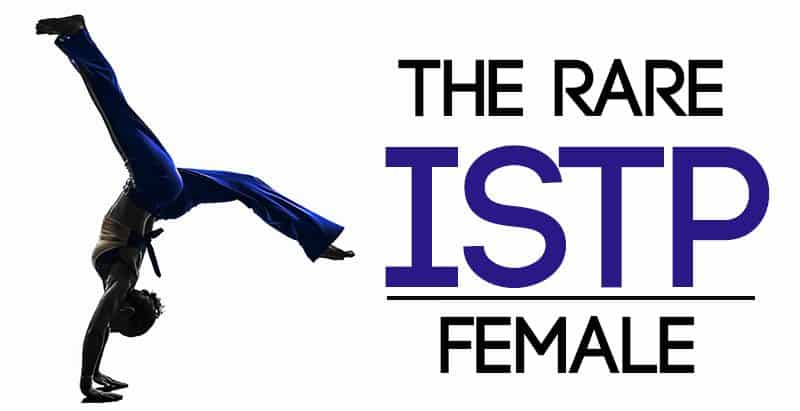







You missed Zoro
Wow I will age myself if I admit to actually watching the Man from Uncle as a child. No wonder I liked that character, as well as Jason Bourne. But wait, is Indiana Jones some other type?